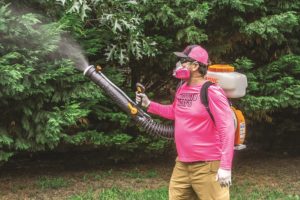WELLFLEET — One month after the Cape Cod Mosquito Control Project began treating breeding areas in the Herring River basin, this year’s proliferating plague of mosquitos is proving more difficult to squash than expected. With the larvicide approach off to a late start and working slowly, home owners are turning to private spraying — something experts say should be undertaken with caution and low expectations of success.
When it comes to mosquito control, “larvicide is how to do it properly,” said Larry Dapsis, an entomologist who works for Barnstable County. “In terms of day-to-day relief, spraying for the adults is not a rational solution.” That’s partly because mosquitos can fly long distances, he said — up to 10 miles for certain types. Even if spraying kills what’s in your yard now, more mosquitos will soon arrive from beyond your immediate surroundings.
Curt Felix, owner of the Wellfleet franchise of Cape Cod Mosquito Squad, said that the company offers two mosquito treatment plans: an “all-natural cedar product” and a traditional chemical treatment.
Cedarwood oil is considered a minimum-risk pesticide by the EPA, meaning that it is not regulated at the state level. Minimum-risk pesticides are thought to pose little risk to humans and the environment.
Felix said that the cedar treatment used by Mosquito Squad has been in testing for three years and is “comparable” in effectiveness to the traditional treatment. Dapsis disagreed, saying research shows that natural oil-derived treatments are “completely ineffective” at deterring mosquitos.
Felix would not say what is in the traditional chemical treatment, but according to Chris Miller, a Wellfleet resident who hired Mosquito Squad to treat his yard, the company informed him that permethrin, a standard insecticide, was used.

Mark Faherty, science coordinator at Mass. Audubon’s Wellfleet Bay Wildlife Sanctuary, said he worries about the effects of sprayed treatments on other insects that are important for the local ecosystem, such as bees and butterflies. Permethrin is toxic to both if it comes in contact with them, Faherty said, while research shows that mosquito larvicide has no effect on pollinators.
Felix said that the treatments Mosquito Squad uses are EPA-approved and that customers do not see a reduction in pollinators in their yards after treatment. “There’s a theoretical risk, but people are not seeing it,” he said.
Geoff Sanders, chief of natural resource management and science for the Cape Cod National Seashore, said that the park has no policy on what private citizens do on their property. “I’m not really in a position to say whether that’s good or bad,” he said.
Felix said the Mosquito Squad applies its treatments to foliage. Permethrin is not water soluble, according to Dapsis, meaning it will not run off into the water table when it rains. He said the chemical breaks down naturally in a matter of weeks.
Dapsis said that insecticide spraying can be done “quite safely, as long as the applicator is following the rules.” In practice, that means preventing fogging from drifting away from one yard into neighboring areas. But, he added, he never recommends that home owners spray their yards for mosquitos.
The use of pesticides like permethrin is regulated by the Mass. Dept. of Agricultural Resources (MDAR). There are rules applicators have to follow, such as avoiding drift and minimizing human contact with the spray.
While some residents have embraced yard treatment, others grimace at the idea. Buddy Paine, who lives in Wellfleet, is not a fan. He said he’s seen fogging done on a neighbor’s property drift into his yard, and he showed the Independent a video of a cloud of spray wafting onto his property. He said he has reported the incident to the MDAR.
“We’re trying to do the right thing and really be careful” when spraying, Felix said.
Entomologist Gabby Sakolsky, superintendent of Mosquito Control, the quasi-governmental organization charged with managing mosquito populations on the Cape, said larvicide treatment in the brackish areas, where the insects are breeding, has not yet reduced their populations.
As has been previously reported, Mosquito Control got a late start on the larvicide treatments because it had to wait for special permission from the National Park Service.
Now progress is slow because crews are finding that overgrown vegetation is making it hard to reach some pools of water where mosquitos are laying eggs. Sakolsky said she is in conversation with the Seashore about clearing paths through the brush to access different pools of standing water.
Depending on what’s needed, that, too, could take some time. “There are some things we can approve fairly easily,” said Sanders. But for clearing larger plants, he said, further review will be required.
Sanders also said the overwash at Duck Harbor in Wellfleet that initially brought salt water into the river basin — and provided new real estate for mosquitos to lay eggs in — has continued since the larvicide treatment began.
Despite these new challenges, Sakolsky is hopeful that there will be a noticeable drop in the number of mosquitos in the next several weeks.
The rise in private yard spraying shows the importance of a long-term arrangement between Mosquito Control and the Seashore, Dapsis said. The special permit that has allowed Mosquito Control to treat in the Herring River basin extends through December 2021. Sakolsky and Sanders both said they are optimistic that there will be a longer-term arrangement between the Park and Mosquito Control.
Both the Seashore and Mosquito Control want to be “proactive rather than reactive,” Sanders said. “But we need to agree on what leads to treatment.” Sanders predicted that “more focused conversations” will happen in late August.



